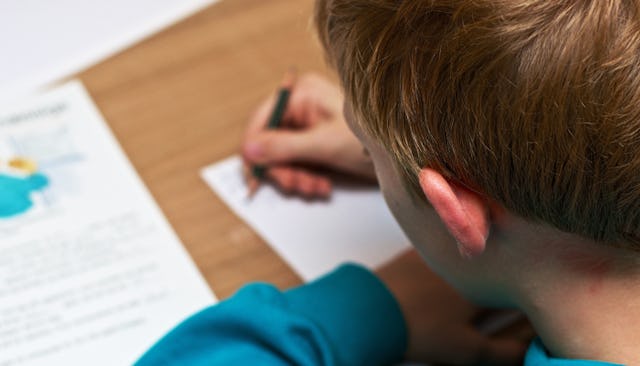I Don't Hate "New Math" and Neither Do My Kids

I have never been very good at math. I know it’s unpopular to be all non-growth-mindset about it6t and say it that way, but it’s true. I grew up in the ’70s and ’80s, and back then, we didn’t have these newfangled growth mindsets. We were just good at math or we weren’t, and I was the latter.
Now I have four children, three of whom are in Florida public schools and learning math the “new way.” You might expect me to hate the way math is taught now. After all, it’s kind of a pain in the rear end. It looks super complicated to my GenX, just-turned-40 eyes, and my brain can’t wrap around all the boxes and hashmarks and steps involved in the seemingly endless word problems. What the heck is an array, anyway? Or an addition sentence? My favorite is when the question is, “Explain how you reached this answer.” How about, “I used math.” Does that work?
But I actually don’t hate “new math.” As someone who has always been, shall we say, math challenged, it makes sense to me that we might want to break it down and teach it in a way so that our children might have a prayer of understanding how math truly works and why. When I was in school, I memorized a lot of formulas. If I forgot a formula, though, I was in trouble; I didn’t understand math enough to be able to figure it out without perfect rote memorization crutches. My children, however, seem to approach math differently. Though they still need to memorize their multiplication tables, they get this new math, even if my feeble middle-aged brain thinks it looks like Greek. They don’t necessarily have to rely on formulas the way I did.
Last week, for instance, I went in to my second grader’s classroom to give them a Math Superstars enrichment lesson. After one word problem, I summarized for the class how they could reach the answer. One little boy raised his hand. “Mrs. Tate, I did it another way,” he said confidently, and then he explained how he grouped the numbers differently than I had, and he came up with the same answer. I never would have thought of the way he did it, but his way was just as valid. On another question, I started to show a child how to dissect another word problem, but found him scratching out a series of circles and hashmarks on the whiteboard before I could open my mouth. Then he wrote the (correct) answer on the line. “That’s right,” I said, rendered a bit speechless. This facility with numbers – this confidence in another way of finding the answers – would have seemed impossible to me at my second grader’s age. But to him and to his classmates, it is a given. I wonder how that attitude might affect how they approach more than math, now and later?
Nearly every parent I know hates Common Core, and the new math is often held up as the evil spawn of the Common Core standards. I’m not completely sold on the Common Core standards, and I do have problems with aspects of my children’s education – namely, I am very frustrated by the overwhelming amount of testing, specifically high-stakes testing, that my children endure in an effort to monitor their progress and evaluate their teachers. My state has more testing than just about anyone. Though I agree that some testing is necessary, the current amount is having a significant effect on the amount of time my children’s teachers have for instruction and creativity in their classrooms. Testing is a separate conversation from the Common Core standards themselves, however, and the Common Core is not all bad. They actually don’t dictate curriculum, and sometimes, the curriculum works. The new math, in my experience, seems to be working. It’s not how I was taught, and it looks nothing like the math I grew up doing. But then, neither does my minivan dashboard, or video games, or my cell phone. The world is full of innovation, after all. Why should this be different? It is a bit more complicated, and it’s more work. But it’s also pushing my children to think deeply and to engage with these numbers in a way I never did. I think there might be value in that in the end.
So when my child has a question on his math homework, I do my best to figure it out with him. But when I am looking at it and it makes no sense to me, I feel no guilt in sending it back to his teacher with a question mark, and that is perfectly acceptable to my children’s teachers. They understand: I don’t get “new math.” It makes me uncomfortable. It frustrates me. Sometimes, it makes me feel like writing one of those ranty notes that I see in viral posts on Facebook. My children, however – you know, the ones who are actually still learning math for the first time? – seem fine with it, aside from the occasional, expected question or bad day. The bottom line is that they are learning math, and they are learning it surprisingly well.
Even to me and my math-challenged brain, that adds up.
This article was originally published on